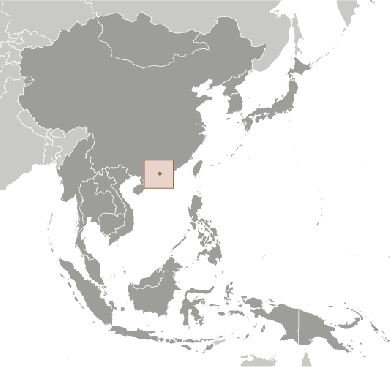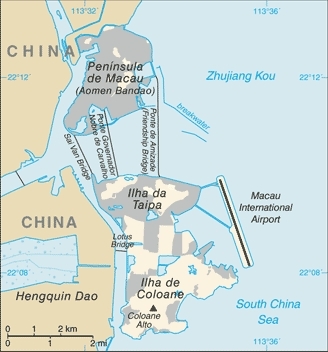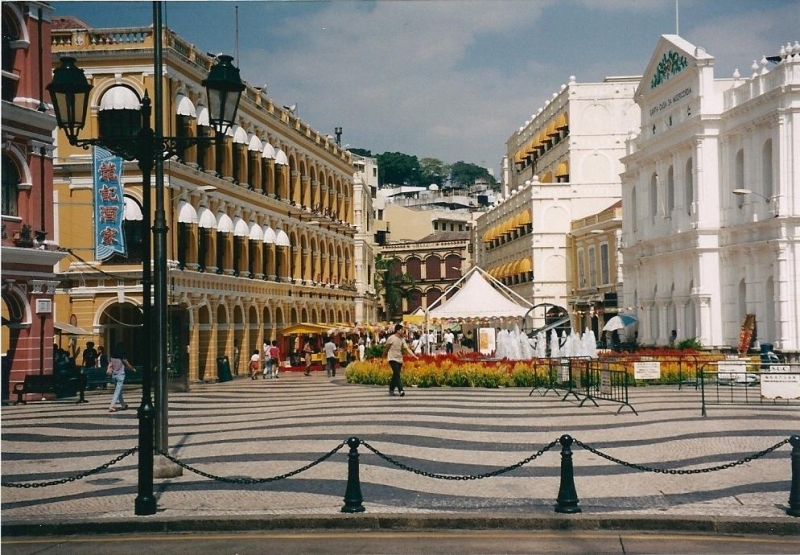Macau
| Topics: |
Macau is Special Administrative Region (SAR) of the People's Republic of China with 580,000 people bordering the South China Sea.Countries and Regions of the World Collection 
Essentially urban, with nearly 600,000 people, Macau is on the western side of the Pearl River Delta, while , another Special Administrative Region, Hong Kong is on the east side.
Colonized by the Portuguese in the 16th century, Macau was the first European settlement in the Far East.
Pursuant to an agreement signed by China and Portugal on 13 April 1987, Macau became the Macau Special Administrative Region (SAR) of the People's Republic of China on 20 December 1999. In this agreement, China promised that, under its "one country, two systems" formula, China's political and economic system would not be imposed on Macau, and that Macau would enjoy a high degree of autonomy in all matters except foreign affairs and defense for the next 50 years.
An area of land reclaimed from the sea measuring 5.2 sq km and known as Cotai now connects the islands of Coloane and Taipa. The island area is connected to the mainland peninsula by three bridges.
Contents
Geography
Location: Eastern Asia, bordering the South China Sea and China
Geographic Coordinates: 22 10 N, 113 33 E
Area: 28.2 sq km
Land Boundaries: 0.34 km with China.
Coastline: 41 km
Maritime Claims: not specified
Natural Hazards: typhoons
Terrain: generally flat. The highest point is Coloane Alto (172 m)
Climate: subtropical; marine with cool winters, warm summers
People and Society
Population: 578,025 (July 2012 est.)
Macau's resident population is 94.3% Chinese, primarily Cantonese and some Hakka, both from nearby Guangdong Province. The remainder is of Portuguese or mixed Chinese-Portuguese ancestry. English is spoken in tourist areas. Macau has 10 higher education institutions, including the University of Macau; 70.2% of the University of Macau's 7,451 students are local and 29.8% are from overseas. Macau is home to 75,098 registered foreign workers, who account for 23.3% of Macau’s total workforce.
Ethnic Groups: Chinese 94.3%, other 5.7% (includes Macanese - mixed Portuguese and Asian ancestry) (2006 census)
Age Structure:
0-14 years: 15% (male 45,635/female 40,523)
15-64 years: 76.8% (male 205,998/female 233,820)
65 years and over: 8.2% (male 22,043/female 24,984) (2011 est.)
Population Growth Rate: 0.866% (2012 est.)
Birthrate: 9.05 births/1,000 population (2012 est.)
Death Rate: 3.85 deaths/1,000 population (July 2012 est.
Net Migration Rate: 3.46 migrant(s)/1,000 population (2012 est.)
Life Expectancy at Birth: 84.43 years
male: 81.47 years
female: 87.54 years (2012 est.)
Total Fertility Rate: 0.92 children born/woman (2012 est.)
Languages: Cantonese 85.7%, Hokkien 4%, Mandarin 3.2%, other Chinese dialects 2.7%, English 1.5%, Tagalog 1.3%, other 1.6%. Note: Chinese and Portuguese are the official language (2001 census)
Literacy (age 15 and over can read and write): 91.3% (2001 census)
Urbanization: 100% of total population (2010)
Senate Square with the Leal Senado (Loyal Senate) building on the right.
History
Chinese records of Macau date back to the establishment in 1152 of Xiangshan County under which Macau was administered, though it remained unpopulated through most of the next century. Portuguese traders began using Macau as a staging port as early as 1516, making it the oldest European settlement in the Far East. In 1557, the Chinese agreed to a Portuguese settlement in Macau but did not recognize Portuguese sovereignty. Initially, the Portuguese developed Macau's port as a trading post for China-Japan trade and as a staging port on the long voyage from Lisbon to Nagasaki. When Chinese officials banned direct trade with Japan in 1547, Macau's Portuguese traders carried goods between the two countries.
The first Portuguese governor was appointed to Macau in 1680, but the Chinese continued to assert their authority, collecting land and customs taxes. Portugal continued to pay rent to China until 1849, when the Portuguese abolished the Chinese customs house and declared Macau's "independence." On March 26, 1887, the Manchu government acknowledged the Portuguese right of "perpetual occupation." The Manchu-Portuguese agreement, known as the Protocol of Lisbon, was signed with the condition that Portugal would never surrender Macau to a third party without China's permission.
When the Chinese communists came to power in 1949, they declared the Protocol of Lisbon to be invalid as an "unequal treaty" imposed by foreigners on China. However, Beijing was not ready to settle the question, requesting maintenance of "the status quo" until a more appropriate time. Riots broke out in 1966 when pro-communist Chinese elements and the Macau police clashed. Through intervention by some of Macau's leading "patriotic" Chinese business clans, an agreement was reached which met local protestor demands and restored order under the Portuguese administration. Portugal tried in 1966 (after the riots) and again in 1974 (following the fall of the Salazar dictatorship) to return Macau to Chinese sovereignty. China, still emerging from the internal turmoil of the Cultural Revolution, declined to accept.
Portugal and China established diplomatic relations in 1979. A year later, Gen. Melo Egidio became the first Governor of Macau to visit the People’s Republic of China. The visit underscored both parties' interest in finding a mutually agreeable solution to Macau's status. In 1979, Portugal and China agreed to regard Macau as "a Chinese territory under temporary Portuguese administration." Handover negotiations began in 1985, a year after the U.K. and China reached agreement that Hong Kong would return to China in 1997. The result was a 1987 agreement returning Macau to Chinese sovereignty as a Special Administrative Region (SAR) of China on December 20, 1999.
Government
Dependency status/Government Type: Special administrative region of the People's Republic of China with limited democracy
The SAR government acts autonomously of Beijing in all areas except foreign affairs and defense, although China's central government has the final authority to appoint the chief executive following his selection and to appoint the chief executive's senior officials on nomination by him.
The chief executive is appointed by the central government for a 5-year term after selection by a 300-member election committee, whose members are nominated by corporate bodies. The chief executive has strong policymaking and executive powers similar to those of a president; no individual may serve for more than two consecutive terms. Chief Executive Fernando Chui Sai-on, formerly Macau's Secretary for Social Affairs and Culture, took office on December 20, 2009. The chief executive appears before a cabinet, the Executive Council (Exco), of between seven and eleven members. The latest Exco, which took office on December 20, 2009, has 10 members.
The legislative organ of the territory is the Legislative Assembly, a 29-member body of 12 directly elected members; 10 indirectly elected members representing four interest groups: 1) employers; 2) labor; 3) professionals; and 4) charity, culture, education and sports; and seven members appointed by the chief executive. In Macau's "executive-led" system, legislation originates in the administration and is submitted to the Legislative Assembly for scrutiny; bills require passage by simple majority, and changes to the Basic Law require passage by a two-thirds majority. In the last election, held in September 2009, a pro-democracy group won an additional seat (increasing to three), a democratic-leaning representative of Macau's civil servants union was re-elected, and traditional and pro-establishment candidates held on to the remaining seats. The city of Macau and the islands of Taipa and Coloane each had a municipal council until January 1, 2002, when the Civic and Municipal Bureau was formally established to replace the two municipal councils.
Legal System: civil law system based on the Portuguese model.
The legal system is based largely on Portuguese law. The territory has its own independent judicial system, with a high court. Judges are selected by a committee and appointed by the chief executive. Foreign judges may serve on the courts. In July 1999 the chief executive appointed a seven-person committee to select judges for the SAR. Twenty-four judges were recommended by the committee and were then appointed by the chief executive. Macau has three courts: the Court of the First Instance, the Court of the Second Instance, and the Court of Final Appeal, Macau's highest court. Sam Hou Fai is the President (Chief Justice) of the Court of Final Appeal.
International Environmental Agreements
According to Articles 13 and 14 of its Basic Law, Macau's foreign relations and defense are the responsibility of China. China does, however, grant Macau considerable autonomy in economic and commercial relations. Macau is a separate customs territory and economic entity from the rest of China and is able to enter into international agreements on its own behalf in commercial and economic matters, as provided in Basic Law Article 136. Macau participates as a member of the Egmont Group, an informal international gathering of financial intelligence units, and is an active member in the Asia/Pacific Group on Money Laundering (APG), a Financial Action Task Force (FATF)-style regional body.
Macau is an associate member on two international agreements on Marine Dumping and Ship Pollution.
Economy
Macau's economy is based primarily on tourism, specifically casino gambling.
After opening up its locally-controlled casino industry to foreign competition in 2001, the territory attracted tens of billions of dollars in foreign investment, transforming Macau into one of the world's largest gaming center. Macau's gaming and tourism businesses were fueled by China's decision to relax travel restrictions on Chinese citizens wishing to visit Macau. By 2006, Macau's gaming revenue surpassed that of the Las Vegas strip, and gaming-related taxes accounted for more than 70% of total government revenue.
The global financial crisis in 2008, combined with restrictions imposed by the People’s Republic of China that limited Chinese visitors to Macau, caused Macau to experience its first economic contraction since the gaming sector was opened to foreign investment. However, accelerating Chinese economic growth and relaxation of Chinese exit visa restrictions boosted Macau’s growth back into positive territory in the third and fourth quarters of 2009.
In 2010, Macau’s economy grew at 17.2%, 31.5%, and 27.1% in the first, second, and third quarters, respectively. Textile and garment manufacturing, once mainstays of the Macau economy, have virtually vanished, and efforts to diversify the economy have had limited success. In 2010, Macau’s exports dropped by 9.3%, with exports to the U.S. falling by 40.2%. Macau is heavily dependent on imports. Imports surged by 19.6% in 2010, and the trade deficit increased to U.S. $4.6 billion. Gaming alone contributed almost 70% of GDP in 2009 and accelerated in the first 9 months of 2010. For the year, Macau gaming revenues totaled U.S. $23.5 billion, a 57.8% surge from 2009. Monthly gaming revenues topped U.S. $2.3 billion in January 2011. In 2010, tourist arrivals rose by 14.8% from 2009. Mainland Chinese tourists accounted for 53% of all tourist arrivals to Macau, with Hong Kong tourists accounting for 29.9% and Taiwan visitors about 5.2%.
Macau depends on mainland China for most of its food, fresh water, and energy imports. The European Union and Hong Kong are its main suppliers of raw materials and capital goods.
In the last few years virtually all of Macau's manufacturing operations, mainly textiles and garments, have moved across the border to mainland China. Mainland competition, along with the end of Multi-Fiber Arrangement (MFA) quotas in 2005, which had provided a near-guarantee of export markets, have augured the end of Macau's low-end mass production of textiles. While still accounting for 23.4% of Macau’s total exports, textile and clothing exports amounted to U.S. $203.4 million in 2010. For future growth, Macau is relying on becoming a regional center for gaming, tourism, conventions, and corporate incentive travel; foreign and local investors have aggressively expanded the casino, hotel, and restaurant sectors. U.S. investment has played a leading role in the development of Macau’s gaming and entertainment sector. According to the most recent Macau Government statistics, U.S. direct investment in Macau totaled U.S. $2.9 billion at the end of 2009, although unofficial numbers put the figure between U.S. $6 billion and $8 billion, making the U.S. Macau’s second-largest source of foreign direct investment after Hong Kong (U.S. $4.0 billion). Direct investment in Macau from mainland China (U.S. $1.3 billion) has been concentrated in the financial sector.
This city of nearly 552,300 hosted nearly 25 million visitors in 2010. Almost 53% came from mainland China. Macau's traditional manufacturing industry has virtually disappeared since the termination of the Multi-Fiber Agreement in 2005.
The Closer Economic Partnership Agreement (CEPA) between Macau and mainland China that came into effect on 1 January 2004 offers Macau-made products tariff-free access to the mainland; nevertheless, China is Macau's second largest goods export market, behind Hong Kong, and followed by the United States.
Macau's currency, the pataca, is closely tied to the Hong Kong dollar, which is also freely accepted in the territory.
GDP: (Purchasing Power Parity): $18.47 billion (2009 est.)
GDP: (Official Exchange Rate): $22.1 billion (2009 est.)
GDP- per capita (PPP): $33,000 (2009)
GDP- composition by sector:
agriculture: 0.1%
industry: 2.8%
services: 97.1% (2009 est.)
Agricultural Products: only 2% of land area is cultivated, mainly by vegetable growers; fishing, mostly for crustaceans, is important; some of the catch is exported to Hong Kong
Industries: tourism, gambling, clothing, textiles, electronics, footwear, toys
Currency: Patacas (MOP)



